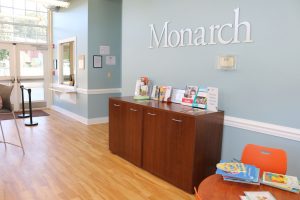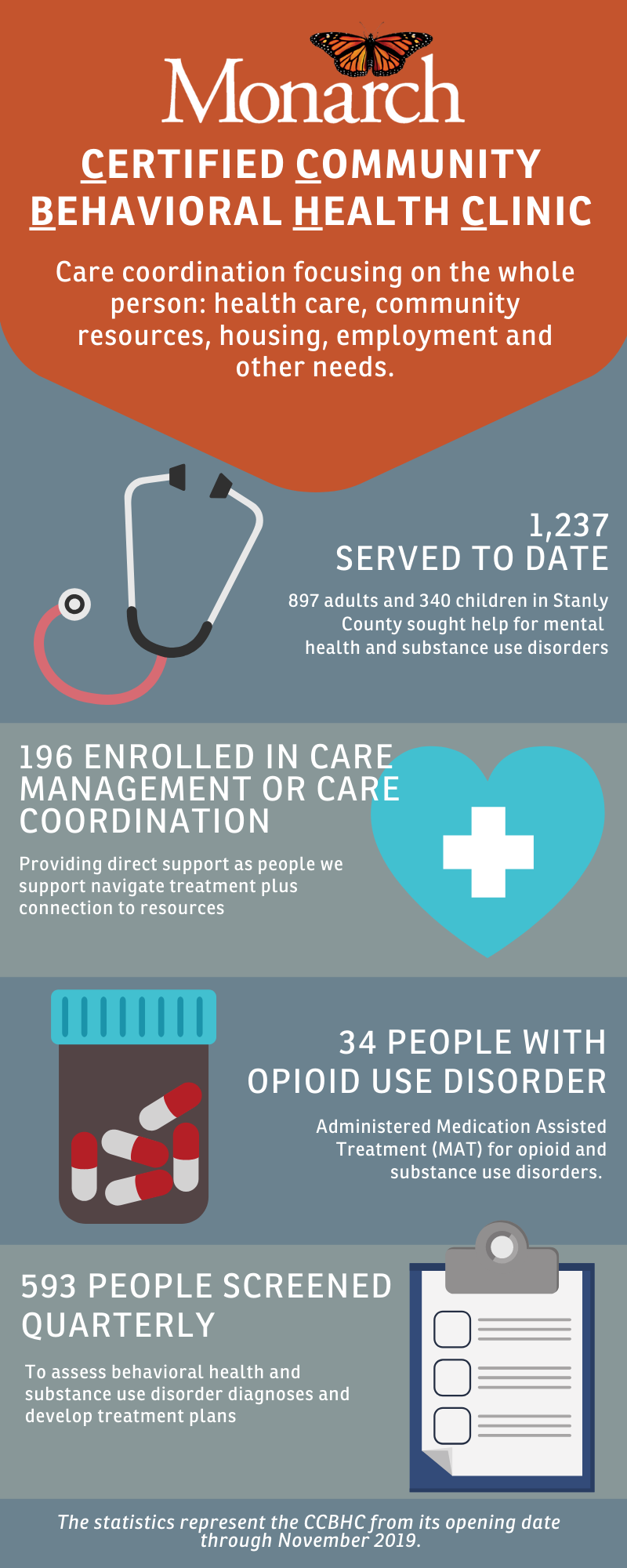Certified Community Behavioral Health Clinic Celebrates Reaching First Year Goals

The Certified Community Behavioral Health Clinic (CCBHC) is celebrating its one-year anniversary looking back on goals met and making plans for the future.
Director of Integrated Care Monique Lucas, BSN, RN, CCM, CCCTM, believes the most important focus of the past year has been establishing the CCBHC as a treatment expert in the fight against opioid dependency, as well as a resource for other vital mental health needs.
In the fall of 2018, Monarch was awarded a two-year, $3.2 million federal part grant to establish a CCBHC in Stanly County through the Department of Health and Human Services’ Substance Abuse and Mental Health Services Administration (SAMHSA). As the past year has been focused on spreading the word about services available, Lucas is hopeful that the inroads made are beginning to benefit those needing services, but she knows community wide efforts like this take time.
Statistically, Stanly County remains among the top counties in the state for emergency services responding to drug overdoses with many of those being opioid related, according to the North Carolina Department of Health and Human Services. During the CCBHC’s inaugural year, life-saving connections have been made focusing on:
• Medication Assisted Treatment (MAT) – the use of medications, in combination with counseling and behavioral therapies, for treatment of opioid dependency or other substance use disorders.
dependency or other substance use disorders.
• Emergency Medical Services (EMS) Partnership – working directly with paramedics as they respond to overdose calls, quickly kickstarting important recovery services and connections with community resources to combat addiction.
• Targeted Case Managers – assisting persons supported with other services such as transportation to appointments, medication, housing and employment. Lucas described this service as the “second pair of eyes and hands” to help the people we support.
Looking toward the future and the second year of funding, Lucas said the emphasis will continue to be on outreach, education and partnership with community agencies. Virtual mental health care centers within Stanly County schools will also connect students with Monarch crisis intervention teams when needed.
Speaking engagement invitations from community groups, hosting open house events and attendance at resource fairs have helped spread the word about CCBHC. One year later, Lucas is encouraged by the people who know and understand the services available at Monarch. “The grant is allowing Monarch to extend our reach to collaborate with partners and that is making a big difference. One of our biggest bonuses is collaboration and pulling together community resources,” she said.
Lucas said they will continue to integrate physical care as a component including screenings for syphilis, hepatitis C and human immunodeficiency virus (HIV), as well as adding a nurse care manager to coordinate care and educate the community about physical wellness.
Targeted Case Manager Greg Crawford, MA, LCAS, who is a veteran and often works with fellow service members, said the staff has witnessed the CCBHC’s impact. “We are not just putting a Band-Aid on it. We are trying to reduce the revolving door in and out of the emergency department . . . The support we provide makes us feel like we are making a difference,” he added.
Targeted Case Manager Brittany Cowan, MA, LCAS-A, said she hopes that the CCBHC’s efforts are helping to reduce the stigma associated with seeking mental health or substance use disorder services: “It is amazing when I see the success of someone who is receiving services. . . I look at it like, we start this journey together and I know how difficult it is. There is a sense of accomplishment all the way around for our CCBHC team.”
For more information about the CCBHC and services offered, contact Monarch at (866) 272-7826.
Photo caption: The CCBHC waiting room.
Posted on: Friday January 3, 2020
